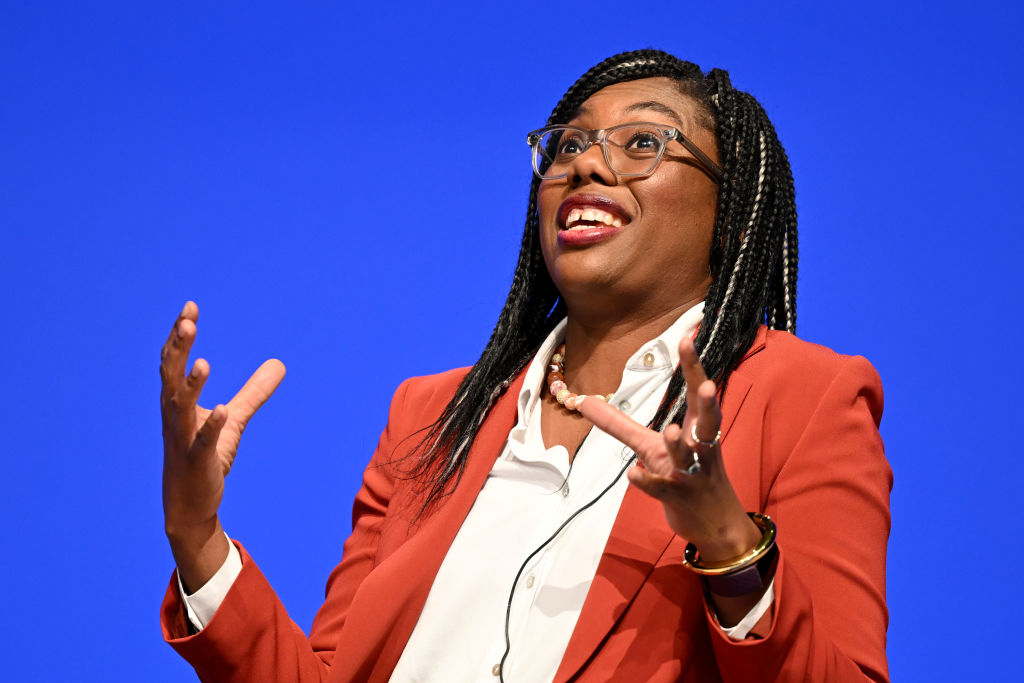Liz Truss wants growth at 2.5 per cent. That figure will allow the UK to pay off the huge cost of her energy subsidy – predicted at around £40 billion – while also putting the public finances on a more sustainable footing. The problem is that growth is elusive. Between the financial crash and the Covid lockdowns, the UK’s average growth rate was just 1.3 per cent.
One of the few sure-fire ways to grow the economy is trade. New markets give companies the chance to grow their sales purely by matching up new consumers with goods that they want. The power to do this, to set our own trade arrangements in a way that aligned with British interests, became a central argument in the Brexit debate. But the new trade secretary Kemi Badenoch isn’t happy with our Brexit-obsessed trade discussions. ‘I’m Brexit fatigued. Everything is framed through the lens of Brexit. It’s time to move on,’ she told a Spectator panel at Conservative party conference this afternoon.
Instead, she sees free trade as a mission, one that Britain is uniquely positioned to capitalise on – especially at a time when the rest of the world seems to be turning away. It’s a difficult trick to pull off. ‘What is frustrating is that when you’re in the UK, you’ll hear “The UK is at the back of the queue”. That is not what the trade secretary of the US is telling me.’ Instead, Badenoch explained, America has had a shift in policy. It wants to stop sending jobs abroad and start bringing some manufacturers back onto US soil. Biden has continued perhaps Trump’s greatest legacy: the rolling back of globalisation. But, according to Badenoch, Britain is still a favoured partner in Washington. ‘They are far more worried about what is going on in Europe than what in our country, and that is because the fundamentals of the UK have not changed,’ she added. But how, if the world is taking this protectionist turn, can Britain get that much-needed growth?
One of Badenoch’s aims is to recognise the shift in thinking towards trade as a security issue. The Russian invasion of Ukraine has shown what happens when the free market relies on actors that are anything but free. Her solution is organisations like the CPTPP, made up of friendly nations like Canada, Australia, and New Zealand. ‘Trade is a tool of prosperity, but increasingly it is now a tool of security,’ she explained. It’s a question of ensuring that trade-fuelled growth is sustainable and that the UK is insulated from the kinds of shocks the war has created.
One questioner asked why, if trade makes us richer, would the new Trade Secretary not consider cutting tariffs completely. Earlier this year, the then-Brexit opportunities minister Jacob Rees-Mogg argued for the removal of tariffs on certain goods that aren’t produced in this country. Such a move would reduce the cost of living crisis, he argued, and wouldn’t risk damaging domestic industries. Boris Johnson was reportedly a fan of the idea. But Badenoch rejected a tariff-free Britain, citing the UK’s need to negotiate on behalf of exporters as well as consumers:
If I’m doing an India trade deal and I’ve already removed all the barriers, then what am I asking for in return? If you’re trying to get market access to countries bilaterally, reducing every single tariff to zero works for some people, it will destroy some sectors and it removes any negotiating capacity to try to get access to another country.
It’s a comment that suggests that Badenoch sees limits to free trade, one that perhaps marks a distinction from her new boss. Her comments on immigration too suggest that the new Trade Secretary isn’t quite on board with the more libertarian elements of the new administration.







Comments